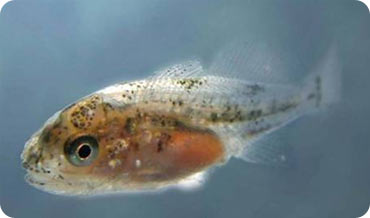If you ever feel sluggish after a meal, like you don’t have the energy to do anything but relax, you’re not alone. A recent study shows that fish may have the same problem. But in the fish-eat-fish world of the oceans, a little siesta after mealtime isn’t a good strategy.
The study was conducted at The University of Texas Marine Science Institute. Researchers examined what happens to young red drum after they eat.
 Young red drum. Credit: Shinnosuke Nakayama.
Young red drum. Credit: Shinnosuke Nakayama.The scientists measured how quickly red drum larvae produced proteins after mealtime. Proteins are essential for all animals. Among other things, they play a key role in growth, which is especially important for very young organisms. But making proteins in the body requires a lot of energy.
The scientists studied red drum larvae that were about three weeks old. They sampled sets of the fish at intervals of two to four hours after feeding. Analysis in the lab measured the rate at which the little fish made proteins, which revealed how much energy went into that process over a 24-hour cycle.
The study showed that, on average, production peaked about eight hours after mealtime, when about half of the fish’s total energy was being used to make proteins. The rate dropped over the next few hours, to pre-feeding levels, then nudged up slightly 24 hours after the meal -- perhaps as the body prepared for the next feeding.
With so much energy going into that one chore, it could be harder for a fish to forage for food or to escape danger -- a hazard that could make mealtime a mixed blessing.

